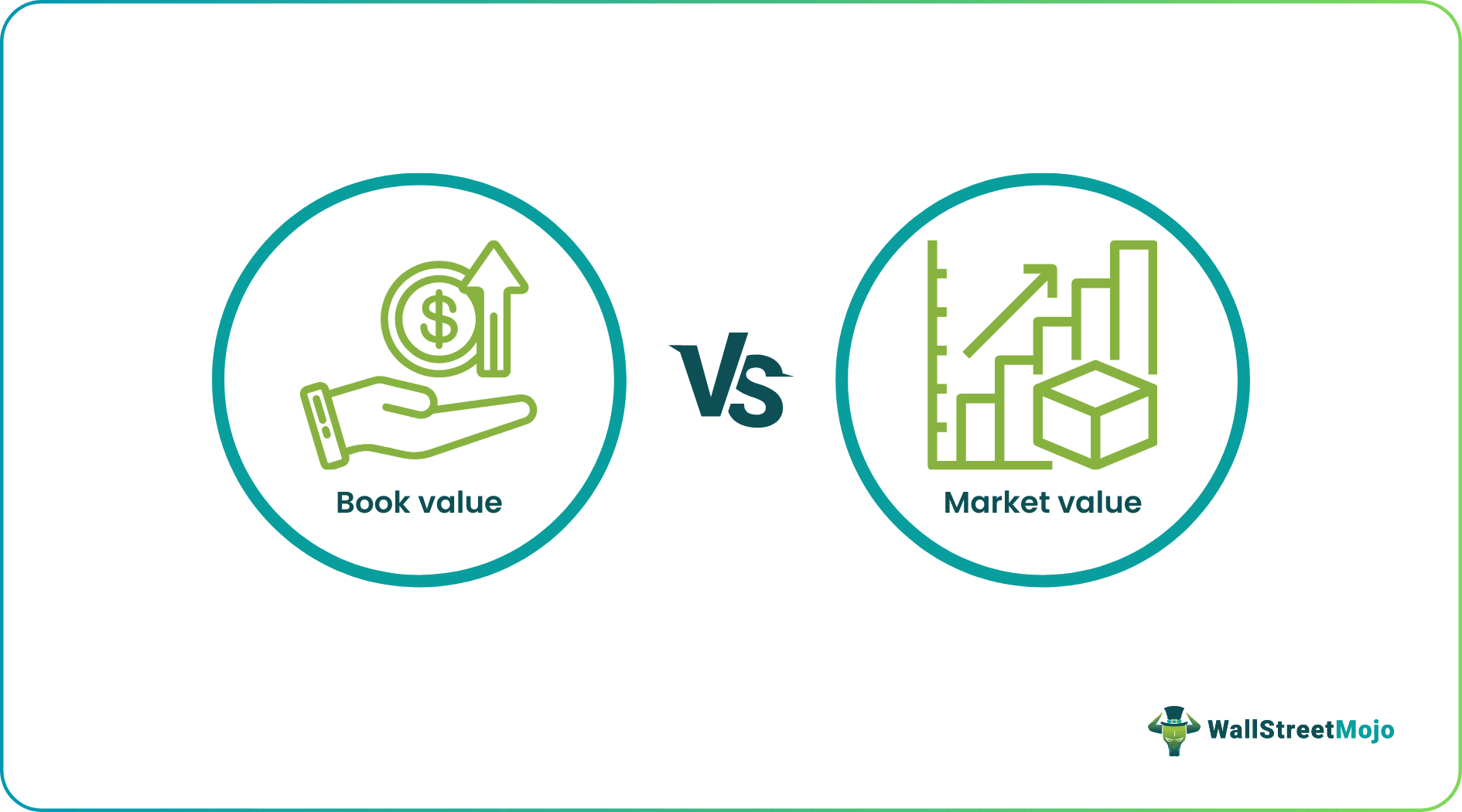Table Of Contents
Difference Between Book Value and Market Value
Book value is the company's net assets value and is calculated as the sum of total assets minus the amount of intangible assets and is always equal to the carrying value of assets on the balance sheet. In contrast, market value, as the name suggests, is the value of the assets we will receive if we plan to sell them today.
Book value and Market value are key techniques investors use to value asset classes (stocks or bonds). Book value is the value of the company according to its balance sheet. Market value is the value of a stock or a bond based on the traded prices in the financial markets. Though the market value can be calculated at any point, an investor gets to know the book value when a company files its earnings every quarter.

- The book value of an asset is strictly based on the company's balance sheet or "Books." Book value is calculated by taking the balance sheet's difference between assets and liabilities. It is also known as Shareholders Equity or' equity or net worth and can be derived from the accounting equation assets= liabilities+ shareholder's equity.
- The market value of an asset is assigned by the investors on that date, i.e., based on the current price of that asset traded in the financial markets.It is calculated by multiplying the market price per share of the company with the number of outstanding shares. It can vary, and it can be more or less than book value at any point in time.
Book Value vs. Market Value Infographics

Book Value vs Market Value - Video Explanation
Key Differences
- Book value is the value of an asset reported on the firm's balance sheet. Market Value is the current valuation of the firm or assets (the ongoing price of the share) in the market where it can be bought or sold.
- Book value gives us the actual worth of the assets owned by the company, whereas Market value is the projected value of the firm or the assets worth in the market.
- Book value is equal to the value of the firm's equity, while market value indicates the current market value of any firm or asset.
- An investor can calculate the book value of an asset when the company reports its earnings every quarter, whereas market value changes every moment.
- Book value shows the asset's actual cost or acquisition cost, whereas the other indicates the current market trends.
- Book value is the accounting value of an asset and is less relevant when a company plans to sell that asset in the market; in comparison, the market value reflects the more accurate valuation of an asset during the buying and selling of that asset.
- The book value of an asset is accounted for in the balance sheet based on historical cost, amortized cost, or fair value. Market value reflects the fair value or market value of an asset.
Comparative Table
| Basis of Comparison | Book Value | Market Value |
|---|---|---|
| 1. Reflects | It is the real worth of the assets of the company. It is the actual worth of the asset of the company. The firm's equity. | Market value is defined as the maximum price at which an asset or security can be bought or sold in the market. The current market price. |
| 2. Basis of Calculation | Book value is calculated by taking the balance sheet's difference between assets and liabilities.
| The market value of a company is calculated by multiplying the market price per share of the company with the number of outstanding shares. |
| 3. Frequency of Fluctuations | Happens at periodical intervals, i.e., infrequent; | Very frequent. Market value fluctuates every now and then. |
| 4. Measurement Bases | The book value of an asset is accounted for in the balance sheet based on historical cost, amortized cost, or fair value. | Market value reflects the fair value or market value of an asset. |
Conclusion
Investors widely use market Value and Book Value of equity to value an asset class. Comparing both for a company indicates whether the company is undervalued or overvalued. If the market value is less than the book value, it implies the stock is trading at a discount and vice versa.
Book value is the accounting value of an asset and often does not reflect the true market value at which an asset can be bought or sold. Market value provides a more accurate current value as it reflects the demand and supply of an asset. Several multiple valuation techniques like (PE ratio, PB ratio, EV to EBITDA Ratio) use market value, or the book value as one of the variables.

